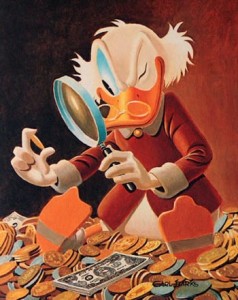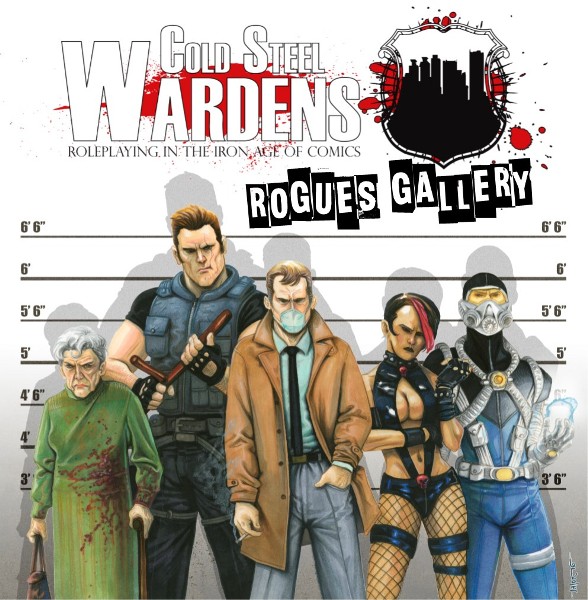Monopolizing the RPG
By The Warden
 Last month, I bitched about treasure and expected some negative (or at least polite disagreements) feedback. Instead, it was in agreement for the most part, meaning I didn’t learn my lesson and now want to up the argument to another level.
Last month, I bitched about treasure and expected some negative (or at least polite disagreements) feedback. Instead, it was in agreement for the most part, meaning I didn’t learn my lesson and now want to up the argument to another level.
I hate money. Not just in my games, but reality as a whole. Everything runs on it and there never seems to be enough to go around. For me, it’s about the massive negative red digits rather than the positives and I am not interested in balancing a fake bank account, coin purse, or armoured vault. And if I was unhappy with many fantasy RPGs and their dependency on treasure, there’s nothing but disappointment waiting across the entire genre of tabletop gaming.
Everything costs money and your characters must collect it and spend it to gain new equipment, magic items, cybernetic enhancements, horses, griffons, spaceships, or spell components. They have been the ultimate form of personal expression from the very beginning of roleplaying games and this tradition carries on to the next generation as computer MMOs offer a free-to-play basic version with equipment available with real world credit cards. We’ve taken RPG equipment from imaginary to actual debt management problems – you know you’re character is awesome because you just sank $20 into slick armour and nuclear weapons for the guy.
Just like treasure, money plays a vital role in managing a core aspect of any roleplaying game: it allows control over their options. Fresh characters only have so much money to work with and it’s likely far below the amount required for the game’s ultimate weapons. Players can get a hold of such items later on once they’ve earned it by playing the game and at an amount determined by the Gamemaster. They’ll never get the armoured tank as a personnel carrier until they’ve reached a point in the game where they’re expected to have that particular vehicle. There are other forms of control in other games, such as level restrictions and skill training (i.e. a powerfully violent weapon is listed as a unique weapon and requires the player to purchase particular traits or feats), but money came first.
As much as I’d hate to admit it, once again mimicking treasure, there’s no avoiding it. I’ve used money in my designs and will likely do so again. That’s not to say I’ve toyed around with the idea of a bartering system in a game (and would love to know if there are any RPGs out there with bartering rules), but found a concern in the length of detail and explanation required to use a bartering system that did not use points as a measurement. Converting items into a point purchase system is basically using money without the currency symbol. Incorporating a trust-based mechanic where players actually barter is possible, yet risky and potential clumsy in the wrong system. For example, a system known for extensive charts and tables with actual player-to-player bartering as its economy would be awkward. It’s no different than any other component of any system: it needs to exist in harmony with every other component individually and as a whole. Using currency in any denomination is simple, effective, and immediately understandable to players the world over.
POST-APOCALYPTIC RELIEF
Right off the bat, there’s a genre begging for a non-economic system: post-apocalyptic RPGs such as Gamma World, Darwin’s World, and sub-settings such as Deadlands: Hell on Earth. In these settings, our precious shopping malls have been converted to zombie condominiums and the only way to obtain new weapons involve taking it from corpses. You keep what you find and it requires an active role in equipment management, thereby requiring the mechanics to work without a dependency on items. Characters in these games must be self-sustaining and their contraptions provide an edge over their opponents.
The consequence of this style is the complete dependency on the Gamemaster for everything in your character’s possession… and this can soar to the Nth degree. In a post-apocalyptic world, the Gamemaster determines when you find food and water because neither is abundant nor common. If you have a weapon deemed too powerful for the GM’s next episode, he just has to wait for you to run out of ammo and the problem’s solved. That’s what makes these games the challenge they’re intended as, much like the newspaper crossword puzzle: it’s about solving a problem using limited resources. The crossword puzzle offers us a brief clue to the answer, which becomes more apparent as the remainder of the crossword is completed. This puzzle simply asks you to build a temporary shelter using nothing but a few bits and pieces of wood, a car engine, and the clothing on your back.
SPIES HAVE ALL THE LUCK
Which brings us to perhaps the best and simplest solution to this financial problem. Spycraft provided their spies with Budget and Gear Points for characters to work with and predominant gadgets required by their agency would be replaced when lost. In other words, whatever you need, the Gamemaster simply hands them over. These rules were adjusted significantly in Spycraft 2.0 and made even simpler than before.
MEASURING SUCCESS
There’s no denying the flip side of this discussion: it’s really fun to spend money without consequences. When you have it, you’ll spend it or save up for something in particular. No one sets up a 401K for their character’s retirement (though quite a few have invested extensively in property, upkeep, and employees for decades). The goal of your typical RPG is not to collect as much money as possible, which is why there is no Monopoly RPG. (That being said, watch a link to someone’s Savage Worlds hack of a Monopoly RPG suddenly appear.)
In a strange way, money becomes a character level all its own. Even in a game where there are no character levels or significant forms of gauging power and experience, the amount of money in your character’s pocket represents all that and more. Not just that you survived the experience, but profited from it in many ways to go above and beyond. Think about it. If you see an 18th-level character with only pennies to his name, do you think that character’s done well or just scraped by? A wealthy character of the same level with an arsenal at her disposal and a floating fortress she calls a home, this character has some stories to tell and you can pretty much guess the ending. Poor characters have their own interesting stories, but they involve a lot more scraping.
This rewarding process has exploded in the computer RPG, particularly in MMORPGs, as player can accomplish individual quests, engagements, and transactions to earn more money and bump up their attacks, defences, and abilities by participating in auctions, for example. Characters can change significantly without the need for questing, as I’ve seen with many of my friends’ level 80 World of Warcraft characters.
Seems there’s no way around it. Fake money is just like real money; you can’t do anything without it. And you know what? That’s… that’s OK. It serves a purpose in the well-being of a game’s mechanics, character advancement, and difficulty level. There is no superficial purpose to currency in our games and they can be manipulated to work in favour of both player and Gamemaster alike. Rather than fight it, I should embrace money and find ways to make it work for me rather than plague me. Or take the vow of poverty for monks. Yeah, that works too.



Perhaps you should keep looking for a topic that is contraversial. I’m not a big fan of wealth management in RPGs either; it’s a necessary (and tedious) evil to deal with in games like D&D/Pathfinder. d20 Modern attempted to abstract it with its own wealth system, but it was still very numbers-based and still not very fun.
In Psi-punk I tried hard to figure out how to replace wealth, but instead what I got was sort of a simplified version of d20 MOdern’s system (without the need to roll vs. a modifier to determine whether or not you can purchase a can of hairspray).
Basically, I tried to whittle it down to the essentials: mundane and common equipment simply doesn’t cost anything, nor does it have any real game statistics. Characters and GMs work together to decide whether or not something they need/want is reasonable for them to have at the present time.
It’s really hard to justify letting people have their way with guns, armor, cyberware, vehicles, and so forth though. Those oten have their own game mechanics and need some sort of balance. I wound up with an abstract wealth system that applied simple, FUDGE-based values to everything and some general guidelines for GMs on how to price non-mundane items. Then removed the need to roll dice for acquisitions.
It’s probably not perfect, but I think I did a good job of getting rid of money as a constant, tedious, management sub-game.
More controversial, eh? Duly noted. ;)
It’s a trap I was stuck in with my designs for Killshot as equipment (particular weapons) are an essential element to the game and assassins’ abilities to get jobs done. Combined with the fact professional assassins need to get paid for their work (the definition of professional), using money was pretty much an unwanted and necessary demand.